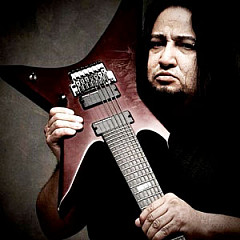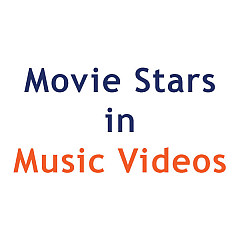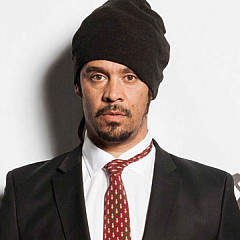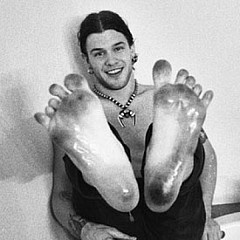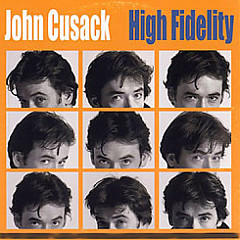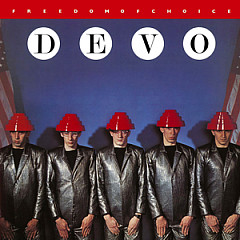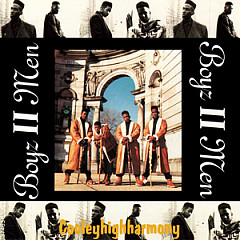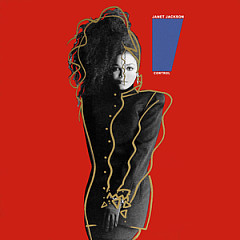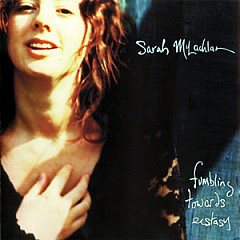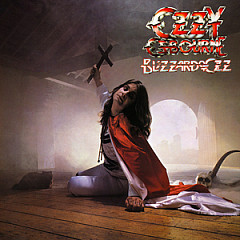 Through most of the 1980s, the Butthole Surfers were on the road; dropping acid to stay awake for marathon 3000-mile drives to gigs on opposite coasts; living out of a van for three solid years without homes, love interests, or money of which to speak. The road was where the Butthole Surfers made their living, and the foundation upon which they built their legendary reputation. The early part of the decade was spent meandering the streets and back alleys of towns to get themselves noticed, the latter part was spent flying to play one-off gigs at large theatres to satisfy the throngs of freaks, punks, art-fags and ne'er-do-wells who worshipped the ground upon which they walked... and to earn their keep of being the one of highest grossing independent bands on the road.
Through most of the 1980s, the Butthole Surfers were on the road; dropping acid to stay awake for marathon 3000-mile drives to gigs on opposite coasts; living out of a van for three solid years without homes, love interests, or money of which to speak. The road was where the Butthole Surfers made their living, and the foundation upon which they built their legendary reputation. The early part of the decade was spent meandering the streets and back alleys of towns to get themselves noticed, the latter part was spent flying to play one-off gigs at large theatres to satisfy the throngs of freaks, punks, art-fags and ne'er-do-wells who worshipped the ground upon which they walked... and to earn their keep of being the one of highest grossing independent bands on the road.Cited as an influence by everyone from Kurt Cobain to Perry Farrell, for the first time ever, the complete story of the Butthole Surfers is told in a new book. Featuring exclusive interviews with band members, and those left indelibly scarred, Let's Go to Hell is the story that was thought, and often hoped, would never be told.
Courtesy of the author James Burns, here is the first chapter.
Punks, Not the Dead
FE: It's not easy to figure out the chronology or personnel of the band's recordings since there's never any info on the record sleeves... that makes documenting the band's career pretty tough.
King: It shouldn't really matter. Who really cares?...
~Forced Exposure magazine, April 18, 1986.
 The passage of time has a strange way of distorting the past. The lens through which we view people, places and events becomes cloudy over time, skewing their meaning and significance. Our vision gets morphed and warped into some kind of strange alternate reality. We may claim that maturity and experience has made us wiser, therefore giving us a new context with which to view the past with greater clarity and perspective, but that, of course, is not always the case.
The passage of time has a strange way of distorting the past. The lens through which we view people, places and events becomes cloudy over time, skewing their meaning and significance. Our vision gets morphed and warped into some kind of strange alternate reality. We may claim that maturity and experience has made us wiser, therefore giving us a new context with which to view the past with greater clarity and perspective, but that, of course, is not always the case.It is through this warped lens that we believe that a concert held in a big, muddy field back in 1969 somehow affected anything at all; either socially or politically. To this day, there are still throngs of people who make the pilgrimage to the town of Woodstock each year, despite the fact that the site of the concert was actually 70 miles southwest in Bethel, NY. This distortion of reality is often better than the truth itself. Woodstock, the town, is a quaint village of shops and a bastion for artists and like-minded, eccentric individuals; whereas, until recently, the spot where the Woodstock Festival actually took place remained little more than barren farmland. (A performing arts center opened on the site a few years ago).
Maybe for that brief moment in time, there was a spark of hope that we could all live together as a community, or perhaps segregated, and apart from the so-called normal man. But, as has prevailed in so many cases throughout the history of this country, violence and greed won. It wasn't enough to frolic naked in the mud. If any real change was going to take place in the minds of the masses, it seemed as if it would have to come via the route of the Chicago Democratic National Conventions, and not via the Marches on Washington, nor the huge festival concerts, for that matter.
Any chance at peace and love was lost on the balcony of the Lorraine Motel in Memphis, or lay bleeding to death on the floor in the kitchen of the Ambassador in LA. The last vestige of hope was murdered at a Speedway near San Francisco, fittingly close to where the first cries for peace and love had emanated just a few years prior.
Still, the nostalgic few who show up each August to the town of Woodstock, to try to rekindle some semblance of those three days of Peace, Love and Music, but when their vacations are over, they return to their mundane realities. Like Dustin Hoffman's portrayal of Benjamin Braddock in Mike Nichols' The Graduate; they stare off vacantly into space; dreaming, and wondering if the toil to attain "The Dream" really meant anything at all, or if the prize they worked so hard to attain was not as fleeting as the three days themselves. 'After Hendrix, there's a huge traffic jam back to the Thruway, man...'
The punks seemed to understand this better than anybody. The hippies had failed. They were misguided idealists. The punks knew that the only way to change the system is to cram the greed and hypocrisy down the throats of the oppressors. Hold up a mirror to their faces and make them look. Ask the questions and not give the bullshit mongers the chance to spin the answers.
Punks didn't want to out like their parents had. They didn't want to 'sit-in' until the cops came along with the tear gas and billy-clubs to restore law and order. They wouldn't be content to just sit around and wait for instant karma to get them, or for The Man to come down in riot gear and shoot them dead. Never again to People's Park, or Kent State! Let's finish what Mario Savio started!
The hippies may have planted the seeds of a movement, but the farmers were too fucked up on brown acid to till the field properly. Idealism means nothing unless you've got the will to fight. Huey Newton, Abbie Hoffman and Malcolm X knew the score. Che Guevara's face spray-painted on a wall. That's what the punks took away from the '60s, and as much as their parents had abandoned the ideals of revolution, civil disobedience, and letting their freak flags fly; their kids, the smart ones at least, began to realize their power.
And what better way to start a social revolution than through music? Elvis had certainly pissed a lot of folks off just by swinging his hips around. Before long the youth were ablaze with frenzy, and a new cultural revolution was underway. A decade after rock'n'roll changed the landscape of American society, the hippies got hip from the folkies and bluesmen and began to use it to make their own socio-political statements. A decade after the hippie movement had begun, the punks used the lessons of their parents' generation to try to institute their own brand of social change.
What many historians have failed to recognize, however, is the significance of this movement in the United States. Sure the so-called 'punk movement' started in the UK, but just like the rhythm and blues music that spawned the British Invasion, punk rock is a uniquely American phenomenon. The Sex Pistols and the Clash (among others) used the American garage music of the Ramones and the Stooges (among others) to boldly challenge the political establishment of the time. The boredom-leads-to-self-destruction seediness of the lyrical content was replaced with anger at the political and social structure of British society at the time.
By 1976, one-third of all high school grads in Britain couldn't get a job, and racial tensions lead to rioting in the streets. The government seemed completely out of touch with the working class. The time was right for an upheaval. It came, culturally at least, in the form of a 7" single by a bunch of teenagers who had just recently witnessed the Ramones on their first tour of the UK a few months earlier.
 The Sex Pistols ignited the spark, and the countless bands that followed in their wake fanned the flames, but by the late 1970s, the youth of America; themselves faced with a stagnant economy, an oil shortage, a hostage crisis, and the recent ousting of a sitting President; carried the torch forward onto U.S. shores.
The Sex Pistols ignited the spark, and the countless bands that followed in their wake fanned the flames, but by the late 1970s, the youth of America; themselves faced with a stagnant economy, an oil shortage, a hostage crisis, and the recent ousting of a sitting President; carried the torch forward onto U.S. shores.Before long, punk scenes were sprouting up in just about every major city, and many small towns, as well. Like pins in a map, the landscape was dotted with scenes of discontented youths who were not willing to settle for their parent's AmeriKKKa. The punks wouldn't be fooled, as the hippies were, into thinking they could change society's mind while working within its established framework. Instead, they operated from the outside the mainstream and created their own underground social networks.
From bands, to artists, to writers who published their own fanzines, to the few, brave club owners who booked the bands, and ingenious kids who started their own labels and booked their local VFW halls when the establishment wouldn't have them. It took a total effort to fight the greed-heads and the war mongers. If hippie idealism was going to mean anything, it would take more than three days in a muddy field or a random march to change things. It would take a 365 day a year struggle.
New York and Los Angeles naturally caught on first, but it wasn't long before punk scenes could be found in every major metropolitan area: Chicago, Detroit, Akron, Phoenix; it was inescapable. By the time the Sex Pistols played the Longhorn Ballroom in Dallas in 1978, a local band, The Nervebreakers, was opening up for them. After that, punk bands started sprouting up all over Texas: The Dot Vaeth Group, Superman's Girlfriend, The Huns, Terminal Mind, the list goes on and on. Shortly thereafter, bands like the Big Boys and The Dicks, both from Austin, became legends of their local scene. And it was around this time in 1981 that two young men who were attending Trinity College in San Antonio decided to form their own band.
Like so many other kids around the country, they were thrilled by the new wave of music bubbling up from the underground. They had been raised on bands like Grand Funk Railroad, the 13th Floor Elevators, and Moving Sidewalks but, now, trapped in a world of AOR soft rock radio and bad local cover bands, were lost to find much of anything that captured the same kind of energy and excitement commercially.Instead, they began listening to bands that were far removed from the commercial bands of the late 1970s; bands like Television and the Jam; The Fall, Wire, Surgical Penis Klinik, and Chrome; as well as the records being pressed up by many of the small, independent labels around the country. Labels like SST in LA, Placebo in Phoenix, and Alternative Tentacles in the SF Bay Area. Each label offered a glimpse into their own local bands, and local scenes. There was an incredibly diverse group of kids who shared, if nothing else, a similar belief that rock music was getting dull; art was becoming unchallenging, and that anyone who had something to say should be given a vehicle to be heard.
By the mid-1970s, there was little room for experimentation in popular music. The idea of forming a band before the age of punk rock seemed almost futile. Major labels ruled the marketplace, and Adult Contemporary music topped the charts. It was a time for Fleetwood Mac and the Eagles; and for bands who were already well established, and who grossed more in LP and ticket sales than most Third World countries' GDPs.
After Nixon's resignation in August of 1974, and the fall of Saigon less than a year later, the country was exhausted. There seemed to be a need for the familiar; and the desire for a pillowy-soft complacence. The bands of the day seemed more than willing to provide the soundtrack to lull kids into a slumber. Rock music was becoming another commodity, and stadiums were filled with kids who were buying into the banality of most commercial rock.
But there were many other kids who were drawn to the vibrancy of a new, emerging music scene. Among them were Paul Walthall and Gibson Haynes, and like so many other kids, they decided to form a band. They were actually a bit older than most who chose the vocation of punk music, as Gibson was already pursuing his Masters Degree in Accounting at Trinity University, where Paul had recently stopped attending, just one semester shy of his MBA.
Paul still had the guitar his parents gave him in the 3rd grade, and had started his first band, the Crowd Pleasers, in 6th grade, but he hadn't picked it up at all since high school. He wasn't even sure he could still formulate a chord. But, Gibson's suggestion to start a band seemed like a pretty good way to blow off some steam, and the beauty part was that neither Paul, nor anybody, needed to be Jimmy Page to play punk rock music.
Gibson, who preferred Gibby, was on the verge of graduating after being named "Accountant of the Year" during his senior year at college. Everything seemed to come together when he scored a staff auditing job at what was the largest accounting firm in the U.S at the time: Peat, Marwick, Mitchell & Co. A golden future was sprawled out before him. He had been captain of the basketball team, president of his fraternity, and was a mere heartbeat away from the American Dream of a Cadillac in the driveway and 2.2 little tykes scampering in the yard.
But alas, most of us know at least THAT much of the story. Gibby Haynes did not go on to be the star accountant he seemed destined to become; and Paul Walthall would become known as Paul Leary, using his middle name instead of his last to avoid any embarrassing mix ups with his dad, Paul Walthall, Sr; a Dean in the Business and Management school at Trinity.
The two would go on to become among the most notorious figures in rock music: founders of the Butthole Surfers. Like microcosms of the movement itself, Gibby and Paul turned their backs on the establishment to create their own alternate reality; with its own set of rules; rules which were grounded in, but certainly not confined to those of the punk rock movement.
And, as the passage of time has distorted so many memories, so too has it distorted the importance and significance of the Butthole Surfers within the realm of popular music. Today, we may think about the absurdity of a band with a name like this having a bona fide Top 40 hit song; or the unfortunate lawsuit with their former record label to obtain the rights to their old recordings. Perhaps some have heard about onstage sex shows, or Gibby's stint in rehab with Nirvana front man, Kurt Cobain, but these facts and half-truths do little to tell the whole story.
 For those of us who remain in awe of the band: the power and brilliance of their live performances, the diversity of their recorded output, and their refusal to stay down despite the endless adversities heaped upon them, the Butthole Surfers are one of the most important bands in rock music history. They are not just a footnote in the histories of all the bands who have been influenced by their work, but worthy of a study all their own; and certainly worthy of more credit than they have often received.
For those of us who remain in awe of the band: the power and brilliance of their live performances, the diversity of their recorded output, and their refusal to stay down despite the endless adversities heaped upon them, the Butthole Surfers are one of the most important bands in rock music history. They are not just a footnote in the histories of all the bands who have been influenced by their work, but worthy of a study all their own; and certainly worthy of more credit than they have often received.At a time when the flame of what was the U.S. punk movement was flickering out, and the alternative music scene was basically a non-entity, the Butthole Surfers were in their prime; keeping alive the last vestiges of independence long after many of the old punk bands had imploded or fizzled out; and while the music industry floundered and wallowed in stagnation.
By 1988, they had become one of the highest grossing independent bands on the road, commanding, by some accounts, as much as $15,000 per performance. Even before their breakthrough "hit" song, celebrity sightings at their shows were commonplace.
Their touring ethic during the 1980s was rivaled by no one. Even the Minutemen, known to play 50 shows in about as many days, had homes to return to when their tour was done. The Butthole Surfers lived out of their car for the better part of three whole years, with any home they had on paper merely a place to store the equipment they amassed while ping-ponging their way across the highways and bi-ways of America.
And it was in the live setting where the Butthole Surfers had you in their command; like the somnambulist hypnotized by Dr. Caligari's music; Cesare murdering the innocent, or rather the innocence, of all that had been known prior to this. Like Ellen Ripley at the end of Ridley Scott's Alien, we the audience are assaulted by lights flashing and sirens wailing and the bottomless pit in our stomach as we realize that we might be eaten alive by this monster at any moment. Still, we tread slowly along, hoping to reach safety, but never quite knowing what lies around the next bend.
The monster being referred to in this case is not some other-worldly being. The monster is us: it is sex, death, drugs, life, lies, neuroses, and politics. Not the politics of government, but the politics of the mind.
Certainly the Butthole Surfers live performances were far more forms of social protest than those of just about any of the so-called 'political' bands of the era. But, there were no slogans, nor call to arms. Shows were a shredding of the fabric of American society simply by pissing on the cultural norms of American society. They were a mirror held up to the faces of the guilty in power. 'You created this monster. You will be forced to acknowledge your part in this... you will feel the wrath of 10,000 Gods if you do not build me a bride!!...'
Ahem... but, of the music, you say?...
The Butthole Surfers' music was at once endlessly diverse, while still being uniquely Texan. They were the culmination of a multitude of musical styles their home state had delivered over the previous 50 years or longer: from country to garage to psychedelia to classic rock. They owed as much to Roky Erickson as they did to the Dicks, and while their early sound resembled the latter, they would always, even in their earliest incarnations, pay homage to the rich musical roots that ran deep beneath the oil-rich soils of Texas.
Listening to the first EP, which the band released on Alternative Tentacles Records around July of 1983, one can hear everything from raging hardcore to delta blues, to late '70s post punk and dime-store psychedelia. From bawdy sea chanteys to art damaged noise, the record skewers a kabob of more genres than it has songs themselves.
And as the idea of what it meant to be punk in the 1970s began to give way to the narrow-minded view of what punk rock was supposed to be by the middle-1980s, the Butthole Surfers was one of the only undeniably "punk" bands that was able to maintain its fan base, even while the strobe lights pumped, the films rolled behind them, and 10 minute improvisational jams became staples of their live experiences.
Of course, their success was not an overnight phenomenon. A long slog was traveled to order to garner even the humble amount of recognition they were able to achieve. The irony that the band was able to release their first EP may even overshadow the irony that a band so vehemently anti-establishment was able to score a Top 40 hit song.
Before they ever had time to ponder any successes, however minute they may have been in the years before "Pepper" was released, they were on to the next town; recording their next session, and cultivating their next incarnation. Just when you thought you could predict what was coming next, you were left stupefied. By the time you were rising, they were in Phoenix...
And like history distorted by time and perceptions, the Butthole Surfers story has been based as much on legend as on facts; lost in a cloud of Dadaist ramblings and inside doody jokes. Few interviewers yielded any real information, and fewer still were left with any more of an understanding of the band than that which they had upon entering the room.
As for the albums; they were released with no song titles on the sleeves, no liner notes, no studio information, no recording or engineering credits, no band member lists or photos, or lyrics, and often with the suggestion that you play the record itself at 69rpm. Fans were left to fend for themselves for any iota of information they could gather.
In the world of punk rock, where so many bands were attempting to change the listener's minds by telling them what they should think; with lyrics printed on the sleeves of records, and inner sheets filled with political posturing, the Butthole Surfers never claimed to have the answers. They never tried to tell you that the world is fucked up. They simply created a fucked up world that was all their own, and through that, held up a mirror to society that spoke volumes about our own skewed norms and values.
By converting their own congregation of freaks, outcasts and misfits who existed outside and completely separate from "normal society", they themselves became a dangerous political movement. A certain secret society within, but separate from, the so-called normal society at large. And a secret society is far more dangerous to the AmeriKKKan way of life than screaming to change the political machine from within its confines. Certainly, the Attorney General and FBI believe this is true. Ask David Koresh, or Randy Weaver.
It was a creation of an alternate society and alternate reality free from the confines of time and space... floating high in the air and rebounding down from the ceiling... like a voice spinning in endless repetition of a phrase over and over again, sped up to a high pitched chirp... with a bit of flange... zapping around the room... backwards and forwards, and high above your head before fluttering away into the stratosphere... fade out...
September 16, 2015.
Excerpted from Let's Go to Hell: Scattered Memories of the Butthole Surfers. Get the book, and more information on James Burns at his author page.
Photos: James Burns (1, 3), Ken Salerno (2).
More Song Writing

